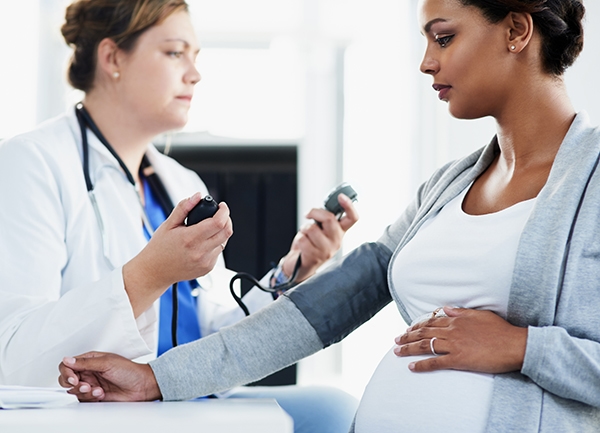
High Blood Pressure During Pregnancy: Why It's Monitored
Higher blood pressure during pregnancy is very common. And for most people, it isn’t harmful. In some cases, however, it can lead to complications. That’s why your blood pressure is checked at each prenatal visit — and just one reason that receiving proper pregnancy care is so important.
Keeping your numbers in check
Believe it or not, there are different types of high blood pressure that can arise during pregnancy.
Gestational hypertension
This type of high blood pressure starts after the first 20 weeks of your pregnancy and usually goes away within 12 weeks of delivery. Though it typically isn't serious, it sometimes causes more severe issues to develop.
Chronic hypertension
High blood pressure that begins during the first half of pregnancy is called chronic hypertension. Some people with chronic hypertension may have had it before becoming pregnant but didn't find out until they got their blood pressure checked during a prenatal appointment.
Preeclampsia
A spike in blood pressure after the first 20 weeks of pregnancy is called preeclampsia. Usually, this occurs during the third trimester. This can be very serious, even life-threatening, for you and your baby. Without treatment, it can lead to eclampsia, which causes seizures. It can also lead to HELLP syndrome, a condition that causes serious blood and liver problems.
What if I’m just nervous?
While it’s perfectly normal to be nervous at your prenatal appointments, sometimes this causes your blood pressure to rise. The best thing you can do is tell your provider how you’re feeling — and why you’re nervous.
You should have your blood pressure taken with your feet flat on the floor, back supported and after sitting fairly still for at least five minutes. If your blood pressure is a bit high on the first take and you’re feeling nervous, ask your provider to take it again at the end of your appointment.
Sometimes worry about your baby can add to your nervousness. It may help to ask your provider to take your blood pressure after you hear baby’s heartbeat and have a chance to ask questions. Chances are, if you’re experiencing “white coat hypertension” during pregnancy, a few successful visits getting to know your care team will put your mind at ease.
Are you at risk?
You have a higher risk for developing preeclampsia if you:
- Had high blood pressure before becoming pregnant or during a previous pregnancy.
- Have chronic kidney disease, diabetes or certain other health conditions.
- Have a family history of high blood pressure or preeclampsia.
- Used in vitro fertilization, egg donation or donor insemination.
- Are having multiples, like twins or triplets.
- Are African American.
- Are age 40 or older.
Know the symptoms
A few possible symptoms for preeclampsia include:
- Headache that won't go away
- Vision problems
- Swelling in your hands, feet and face
If you're planning to get pregnant, talk to your doctor now. Make sure to learn more about the signs of high blood pressure and what you can do before and during your pregnancy to help keep you and your baby healthy. Though the cause of pregnancy-related high blood pressure is still unknown, the good news is that, with proper care, it is usually easily treated.
Care that’s right for you and your baby
Our doctors and certified nurse-midwives value the chance to partner with you as grow and welcome your little one. Meet our women’s care team or call 503-261-4423 to schedule an appointment.


